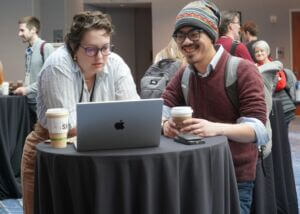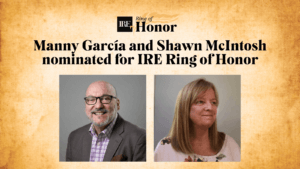Posts by IRE Admin
Proposed amendment to IRE bylaws
The Board of Directors will discuss a change to Article 10 of the organization’s Code of Bylaws at its April 18, 2025, meeting. The Governance Committee will meet on April 4, 2025. and will be reviewing the proposed update to the bylaws, and will advise the Board.
Read More25 things we learned at NICAR25
The NICAR Conference brought together more than 900 journalists, educators and students in Minneapolis! Here are 25 things we learned at NICAR25.
Read MoreManny García, Shawn McIntosh nominated for IRE Ring of Honor
Manny García, Editor in Chief at Houston Landing, and Shawn McIntosh, Head of Standards and Practices at The Atlanta Journal-Constitution, have been nominated for the prestigious IRE Ring of Honor.
Read More

